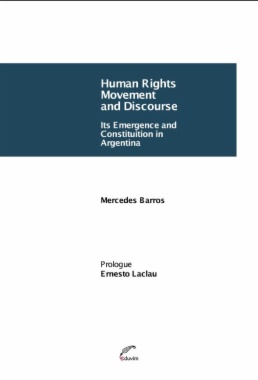This book accounts for the process of emergence and constitution of the human rights movement and discourse during the last military dictatorship in Argentina (1976-1983). Central to this account is the contention that the movement?s emergence and constitution should not be understood as a necessary or as a natural response to the atrocities carried out by the last military regime, but instead as the result of a contingent process of political articulation and as a response which could have failed in its constitution and success.Thus, the appearance of the human rights movement and discourse in the country can only be understood in its full complexity if attention is given to this very process of popular mobilisation and political articulation that took place during 1976-1982.
- Cover
- Copyright page
- Title page
- Table of Contents
- Acknowledgements
- Prologue
- Introduction
- Chapter One. Human Rights in Argentina: Putting in Question Existing Accounts and Providing an Alternative Framework of Analysis
- 1. Approaching Human Rights in Argentina
- 1. a. A New Movement and a New Discourse of Human Rights
- 1. b. Some Questions and Problems
- 2. An Alternative Approach
- 2. a. Placing the Human Rights Discourse in Historical Context
- 2. b. A New Inquiry of the Social: Discourses, Articulatory Practices and Nodal Points
- 2. c. The Primacy of the Political Dimension: Antagonisms, Frontiers, Myth and Imaginaries
- Chapter Two. Putting Rights into Context: the Articulation of the Notion of Rights in the Political Discourses of the Twentieth Century's Argentina
- 1. The Prominence of Individual Rights: the Mark of the Liberal Tradition
- 2. Individual Rights into Question: the Emergence of Nationalist and Populist Discourses
- 2. a. Argentina’s Década Infame (1930-1943)
- 2. b. The Peronist Years (1943-1955)
- 3. Violence and Politics: the Increasing Scepticism towards Individual Rights
- 3. a. The Liberating Revolution and the Eradication of Peronism
- 3. b. The (semi)Democratic Interlude
- 3. c. The Argentine Revolution and the Return of Perón
- Chapter Three. The Experience of Terror: Proceso de Reorganización Nacional
- 1. The Constitution of a New Order: the Emergence of the PRN
- 2. A Non-Conventional War: A Dirty War
- 3. A Non-Conventional Enemy: Subversion.
- 4. War, Law and Morality under the PRN
- Chapter Four. The PRN under Threat: the Challenge of the International Human Rights Discourse
- 1. The International Condemnation of the PRN’s War against Subversion
- 2. The PRN’s counterattack
- 2. a. The Anti-Argentinean Campaign
- 2. b. A Situation of Exception
- 2. c. Leaving War behind: the PRN’s Turn to the Future
- Chapter Five. Silence and Absence: The Effects of State Terrorism on The Argentine Society
- 1. Fear and Silence under the PRN
- 2. Securing the Silence
- 3. The Experience of Absence
- Chapter Six. Breaking the Silence: the First Timid Steps of Coming Together
- 1. The First Encounters
- 1. a. Meeting Others in the Search
- 1. b. Encountering New Spaces: the Human Rights Organisations
- 1. c. The Role of the Human Rights Organisations
- 2. New Forms of Organisation and Resistance
- 2. a. Organising Themselves for Resistance
- 2. b. The Place of Gender
- 2. c. Alternative Spaces and Strategies
- Chapter Seven. Coming into Being: The Constitution of the Human Rights Movement and Discourse in Argentina
- 1. The Incidence of the Human Rights Discourse
- 1. a. Dangerous Affirmations
- 1. b. Some Expected and Unexpected Effects
- 1. c. The First Confrontations
- 2. Defining Themselves vis-à-vis the Other
- 2. a. A Sense of Equality and Solidarity
- 2. b. Constructing the Other: the Effects of Political Frontiers
- 2. c. A New Political Identity
- 2. d. The Non-Necessity of Demands
- 3. The Relatives’ Identification with the Human Rights Language and Cause
- 3. a. Human Rights as That Which is Absent
- 3. b. Human Rights Articulated: the Consolidation of the Human Rights Demand
- Chapter Eight. Democracy and Human Rights
- 1. Human Rights as the Symbol of Resistance to the Dictatorship
- 1. a. Protest and Opposition in the PRN
- 1. b. Human Rights as a General and Common Concern
- 2. Human Rights as a Crucial Moment of the Democratic Discourse
- 2. a. A Break with the Past: Human Rights as Part of the Future
- 2. b. Dealing with the Past: New Understandings and Meanings
- 3. Human Rights and the Democratic Ethos
- Conclusion
- Bibliography

